This eclipse is a part of Saros series 137, repeating every 18 years, 11 days, and containing 70 events. The series started with a partial solar eclipse on May 25, 1389. It contains total eclipses from August 20, 1533 through December 6, 1695; the first set of hybrid eclipses from December 17, 1713 through February 11, 1804; the first set of annular eclipses from February 21, 1822 through March 25, 1876; the second set of hybrid eclipses from April 6, 1894 through April 28, 1930; and the second set of annular eclipses from May 9, 1948 through April 13, 2507. The series ends at member 70 as a partial eclipse on June 28, 2633. Its eclipses are tabulated in three columns; every third eclipse in the same column is one exeligmos apart, so they all cast shadows over approximately the same parts of the Earth.
The longest duration of totality was produced by member 11 at 2 minutes, 55 seconds on September 10, 1569, and the longest duration of annularity will be produced by member 59 at 7 minutes, 5 seconds on February 28, 2435. All eclipses in this series occur at the Moon’s ascending node of orbit.[1]
| Series members 24–46 occur between 1801 and 2200: | ||
|---|---|---|
| 24 | 25 | 26 |
 February 11, 1804 |
 February 21, 1822 |
 March 4, 1840 |
| 27 | 28 | 29 |
 March 15, 1858 |
 March 25, 1876 |
 April 6, 1894 |
| 30 | 31 | 32 |
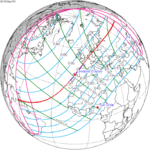 April 17, 1912 |
 April 28, 1930 |
 May 9, 1948 |
| 33 | 34 | 35 |
 May 20, 1966 |
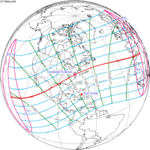 May 30, 1984 |
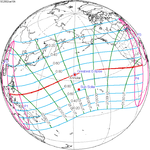 June 10, 2002 |
| 36 | 37 | 38 |
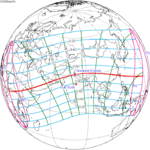 June 21, 2020 |
 July 2, 2038 |
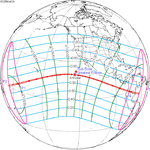 July 12, 2056 |
| 39 | 40 | 41 |
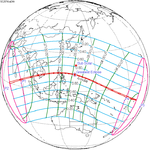 July 24, 2074 |
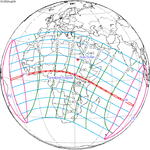 August 3, 2092 |
 August 15, 2110 |
| 42 | 43 | 44 |
 August 25, 2128 |
 September 6, 2146 |
 September 16, 2164 |
| 45 | 46 | |
 September 27, 2182 |
 October 9, 2200 | |
References
- ^ "NASA - Catalog of Solar Eclipses of Saros 137". eclipse.gsfc.nasa.gov.